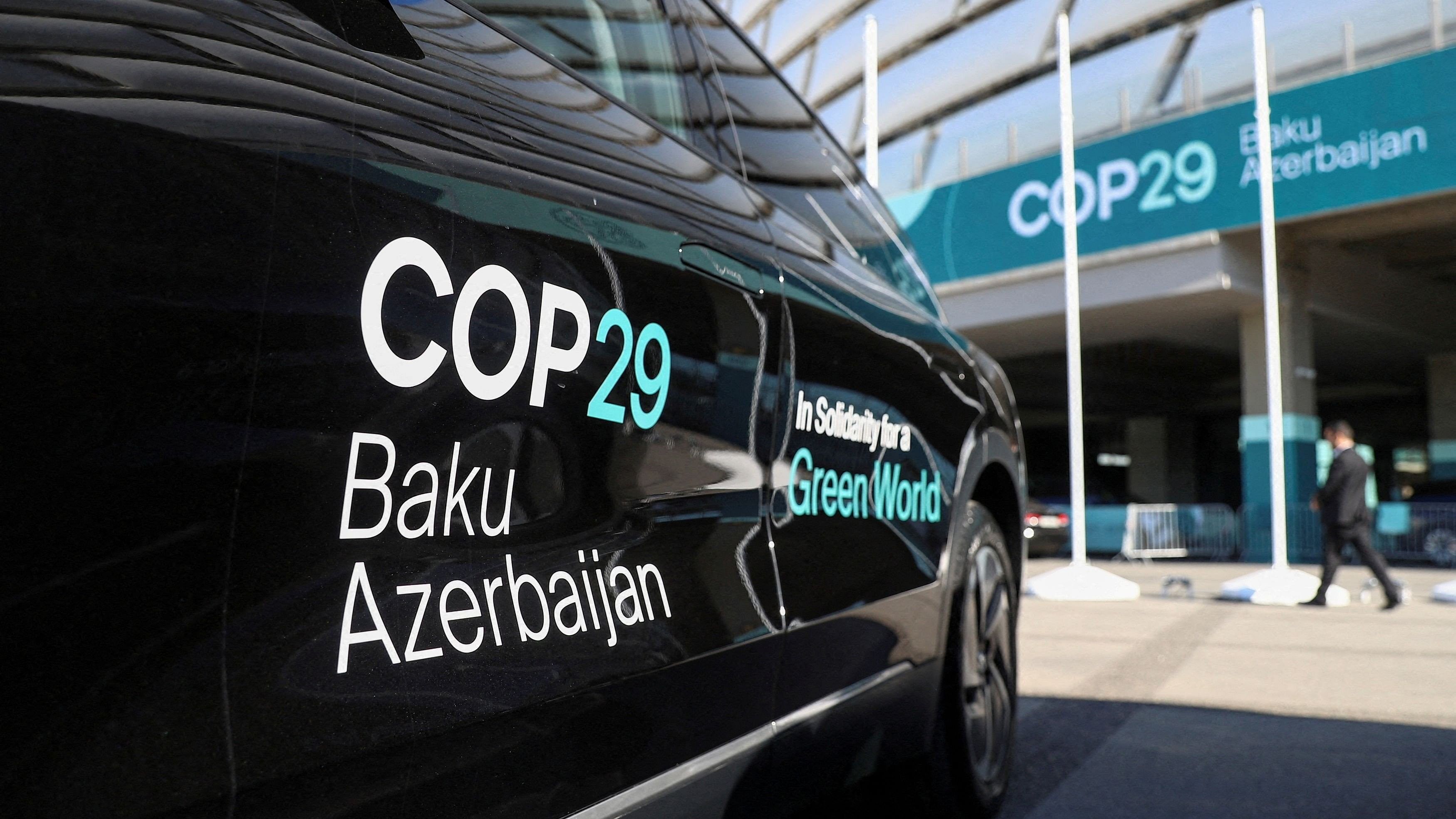
A car is parked at the venue of the United Nations climate change conference, known as COP29, during a media tour ahead of the summit beginning in Baku, Azerbaijan.
Credit: Reuters Photo
The primary focus of COP29, this year’s climate conference in Azerbaijan’s Baku, is determining the financial contributions that wealthier nations will provide to support developing countries. However, war and conflict in Gaza and Ukraine have made this effort complicated, feel world leaders, activists and experts alike. Many negotiators are focused on shaping the New Collective Quantified Goal on Climate Finance (NCQG), which outlines the financial support developing countries will need from developed nations to address climate change, transition to renewable energy, and sustain their developmental priorities.
As negotiations continue around a new climate finance target at COP29, a report from the Independent High-Level Expert Group on Climate Finance was released. The report highlights that global climate action will require an investment of $6.3 to $6.7 trillion annually by 2030, including at least $2.7 trillion for advanced economies, $1.3 to $1.4 trillion for China, and between $2.3 and $2.5 trillion for Emerging Market Developing Countries (EMDCs) outside of China. The report estimates that by 2035, approximately $7–$8.1 trillion in annual global investment will be required for climate action. This represents an increase of over four times in total climate financing and more than six times in external funding by 2030, which is essential to meet the Paris Agreement goals.
The Group of 77 (G77), supported by a broad coalition of developing nations, has also endorsed a $1.3 trillion climate finance goal. Originally suggested by the African Group, this proposal has garnered growing support from the global South. Although previous suggestions ranged from $1 trillion to $1.5 trillion, the $1.3 trillion target marks a significant step forward in these discussions.
The report emphasises that delays in finalising this financial goal will only increase future costs. The required investments for adaptation, as well as loss and damage, are expected to rise, underscoring the urgency of prompt action. The report highlighted the need to actively explore innovative solutions to bridge the current shortfall in concessional financing. Among the proposed measures is the implementation of international taxes on high-emission sectors, which could generate substantial revenue to address the climate finance gap.
India’s statement emphasised the need for greater transparency, criticising developed nations for not fulfilling their $100 billion annual climate finance commitment, a goal established in 2009 and extended through 2025. India also stressed that developed nations must commit to mobilising at least $1.3 trillion annually until 2030 through grants, concessional financing, and non-debt-creating support. This funding should address the changing needs and priorities of developing countries without imposing conditions that could hinder their growth. Brazil, South Africa, India and China urged developed nations to fulfil their climate finance commitments instead of weakening their obligations. They also firmly opposed efforts by wealthy countries to transfer their financial responsibilities onto others.
An annual global temperature update by Climate Action Tracker, released on November 14 during COP29, indicates that current climate efforts remain inadequate. The analysis projects that under existing policies, global temperatures could rise by 2.7°C by 2100, which significantly exceeds the Paris Agreement’s target. And this means that developing countries need more support and funding to meet expenses towards climate-related disasters.
Several developed nations, notably Canada and Switzerland, suggested potential criteria in their technical submissions, such as per capita income or cumulative and per capita emissions for contributors. Switzerland’s proposed formula could expand the list of obligated climate finance contributors to include countries like Russia, Saudi Arabia, and potentially China. The debate over financial contributions at COP29 has grown more challenging following the re-election of former US President Donald Trump, a known climate change sceptic. His campaign promised once again to withdraw the US, which is the largest historical emitter of greenhouse gases and a major oil and gas producer, from the 2015 Paris Agreement.
In the coming months, nations are expected to update their Nationally Determined Contributions (NDCs) for 2035. These are long-term plans outlining commitments to reduce carbon emissions and adapt to climate change, which all Paris Agreement signatories must submit to the UNFCCC. Updated every five years, several countries have already started submitting their revised NDCs for 2035.
China has allocated over $24.5 billion in project funding to assist other developing nations in tackling climate change. It also urged developed countries to enhance their financial contributions and expedite technology transfers to support these efforts. The climate finance discussions at COP29 highlight the pressing need to close the gap between commitments and tangible action. With the world grappling with worsening climate impacts, the effectiveness of global efforts depends on fair financial support that meets the needs of developing countries while allowing for their continued growth. A just transition demands innovative funding solutions, enhanced transparency, and shared responsibility from all nations.
(The author is an independent writer based in Hyderabad. She writes about the environment, science, health, social issues and development)